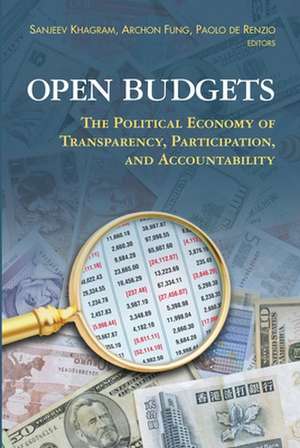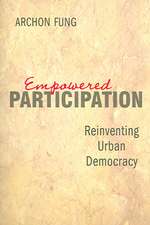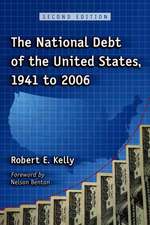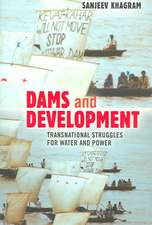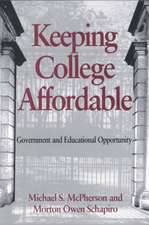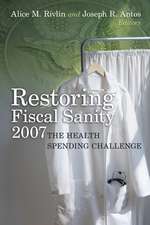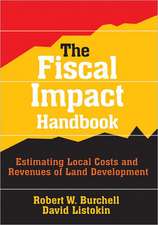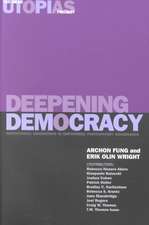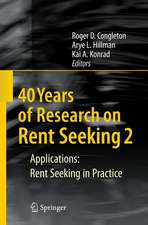Open Budgets: The Political Economy of Transparency, Participation, and Accountability
Editat de Sanjeev Khagram, Archon Fung, Paolo de Renzioen Limba Engleză Paperback – 5 apr 2013
Decisions about "who gets what, when, and how" are perhaps the most important that any government must make. So it should not be remarkable that around the world, public officials responsible for public budgeting are facing demands—from their own citizenry, other government officials, economic actors, and increasingly from international sources—to make their patterns of spending more transparent and their processes more participatory.
Surprisingly, rigorous analysis of the causes and consequences of fiscal transparency is thin at best. Open Budgets seeks to fill this gap in existing knowledge by answering a few broad questions: How and why do improvements in fiscal transparency and participation come about? How are they sustained over time? When and how do increased fiscal transparency and participation lead to improved government responsiveness and accountability?
Contributors: Steven Friedman (Rhodes University/University of Johannesburg); Jorge Antonio Alves (Queens College, CUNY) and Patrick Heller (Brown University); Jong-sung You (University of California—San Diego) and Wonhee Lee (Hankyung National University); John M. Ackerman (National Autonomous University of Mexico and Mexican Law Review); Aaron Schneider (University of Denver) and Annabella España-Najéra (California State University–Fresno); Barak D. Hoffman (Georgetown University); Jonathan Warren and Huong Nguyen (University of Washington); Linda Beck (University of Maine–Farmington and Columbia University), E. H. Seydou Nourou Toure (Institut Fondamental de l'Afrique Noire), and Aliou Faye (Senegal Ministry of the Economy and Finance).
Surprisingly, rigorous analysis of the causes and consequences of fiscal transparency is thin at best. Open Budgets seeks to fill this gap in existing knowledge by answering a few broad questions: How and why do improvements in fiscal transparency and participation come about? How are they sustained over time? When and how do increased fiscal transparency and participation lead to improved government responsiveness and accountability?
Contributors: Steven Friedman (Rhodes University/University of Johannesburg); Jorge Antonio Alves (Queens College, CUNY) and Patrick Heller (Brown University); Jong-sung You (University of California—San Diego) and Wonhee Lee (Hankyung National University); John M. Ackerman (National Autonomous University of Mexico and Mexican Law Review); Aaron Schneider (University of Denver) and Annabella España-Najéra (California State University–Fresno); Barak D. Hoffman (Georgetown University); Jonathan Warren and Huong Nguyen (University of Washington); Linda Beck (University of Maine–Farmington and Columbia University), E. H. Seydou Nourou Toure (Institut Fondamental de l'Afrique Noire), and Aliou Faye (Senegal Ministry of the Economy and Finance).
Preț: 281.05 lei
Nou
Puncte Express: 422
Preț estimativ în valută:
53.80€ • 58.45$ • 45.22£
53.80€ • 58.45$ • 45.22£
Carte tipărită la comandă
Livrare economică 21 aprilie-05 mai
Preluare comenzi: 021 569.72.76
Specificații
ISBN-13: 9780815723370
ISBN-10: 0815723377
Pagini: 264
Ilustrații: black & white line drawings, black & white tables, figures
Dimensiuni: 152 x 229 x 19 mm
Greutate: 0.36 kg
Editura: Brookings Institution Press
Colecția Brookings Institution Press/Ash Center
ISBN-10: 0815723377
Pagini: 264
Ilustrații: black & white line drawings, black & white tables, figures
Dimensiuni: 152 x 229 x 19 mm
Greutate: 0.36 kg
Editura: Brookings Institution Press
Colecția Brookings Institution Press/Ash Center
Notă biografică
Sanjeev Khagram is the John Parke Young Professor of Global Political Economy at Occidental College and Young Global Leader with the World Economic Forum. Archon Fung is the Ford Foundation Professor of Democracy and Citizenship at the Harvard Kennedy School. Paolo de Renzio is a senior research fellow with the International Budget Partnership and research associate at the Overseas Development Institute as well as at the University of Oxford.
Descriere
A Brookings Institution Press and Ash Center for Democratic Governance and Innovation publication
Decisions about "who gets what, when, and how" are perhaps the most important that any government must make. So it should not be remarkable that around the world, public officials responsible for public budgeting are facing demands—from their own citizenry, other government officials, economic actors, and increasingly from international sources—to make their patterns of spending more transparent and their processes more participatory.
Surprisingly, rigorous analysis of the causes and consequences of fiscal transparency is thin at best. Open Budgets seeks to fill this gap in existing knowledge by answering a few broad questions: How and why do improvements in fiscal transparency and participation come about? How are they sustained over time? When and how do increased fiscal transparency and participation lead to improved government responsiveness and accountability?
Contributors: Steven Friedman (Rhodes University/University of Johannesburg); Jorge Antonio Alves (Queens College, CUNY) and Patrick Heller (Brown University); Jong-sung You (University of California—San Diego) and Wonhee Lee (Hankyung National University); John M. Ackerman (National Autonomous University of Mexico and Mexican Law Review); Aaron Schneider (University of Denver) and Annabella España-Najéra (California State University–Fresno); Barak D. Hoffman (Georgetown University); Jonathan Warren and Huong Nguyen (University of Washington); Linda Beck (University of Maine–Farmington and Columbia University), E. H. Seydou Nourou Toure (Institut Fondamental de l'Afrique Noire), and Aliou Faye (Senegal Ministry of the Economy and Finance).
Decisions about "who gets what, when, and how" are perhaps the most important that any government must make. So it should not be remarkable that around the world, public officials responsible for public budgeting are facing demands—from their own citizenry, other government officials, economic actors, and increasingly from international sources—to make their patterns of spending more transparent and their processes more participatory.
Surprisingly, rigorous analysis of the causes and consequences of fiscal transparency is thin at best. Open Budgets seeks to fill this gap in existing knowledge by answering a few broad questions: How and why do improvements in fiscal transparency and participation come about? How are they sustained over time? When and how do increased fiscal transparency and participation lead to improved government responsiveness and accountability?
Contributors: Steven Friedman (Rhodes University/University of Johannesburg); Jorge Antonio Alves (Queens College, CUNY) and Patrick Heller (Brown University); Jong-sung You (University of California—San Diego) and Wonhee Lee (Hankyung National University); John M. Ackerman (National Autonomous University of Mexico and Mexican Law Review); Aaron Schneider (University of Denver) and Annabella España-Najéra (California State University–Fresno); Barak D. Hoffman (Georgetown University); Jonathan Warren and Huong Nguyen (University of Washington); Linda Beck (University of Maine–Farmington and Columbia University), E. H. Seydou Nourou Toure (Institut Fondamental de l'Afrique Noire), and Aliou Faye (Senegal Ministry of the Economy and Finance).
